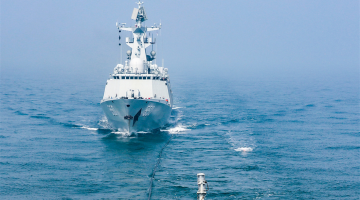By Nie Ran
“Only by building a true European army can the European Union (EU) defend itself...without having to rely wholly on the United States.” French President Emmanuel Macron called for the creation of a “European army” once again on November 6, when participating in international events marking the 100th anniversary of the end of World War I at Verdun, France.
In fact, the European Union (EU) defense integration, including the creation of a “European army,” is an old topic and a big problem. In the 1950s, France proposed the Pleven Plan which claimed to establish the European Defense Community but ended in failure due to a lack of conditions.
The EU was officially established and a common foreign and security policy mechanism for EU was set in 1993. That’s when EU member states got to the issue of defense cooperation once again. The Treaty of Lisbon, having come into effect at the end of 2009, clearly stipulates the EU collective defense responsibilities. However, the progress in EU defense cooperation has always been limited.
President Macron’s dedication to promoting European self-defense not only shows the ambition of the youngest president in French history, but also reflects the dilemma of love and hate between the US and France under the Trump administration. In recent years, especially after Donald Trump took office as US president, the pace of promoting self-defense in Europe has obviously accelerated.
In June last year, the European Commission (EC) announced the establishment of European Defense Fund totaling €5.5 billion to promote defense research and development and joint procurement in member states. In November last year, 23 EU countries signed a joint agreement during an EU Foreign Ministers’ meeting, reaching a deal on “permanent structural cooperation” in the defense field, with a view of jointly developing defense capabilities, investing in defense projects, and enhancing military strength. The move is considered to be “the beginning of the European defense alliance.”
In June of this year, nine EU member states including France, Germany, Belgium, the United Kingdom, Denmark, the Netherlands, Estonia, Spain and Portugal signed a letter of intent creating the European Intervention Initiative. Finland has since joined this initiative. In November this year, 10 countries involved in the European Intervention Initiative convened the first ministerial working conference under the framework of the initiative and determined the main guidelines for military cooperation among relevant countries from 2018 to 2019. According to the joint press communiqué issued after the meeting, the 10 signatories will strive to strengthen cooperation at political and military levels in terms of strategic forecasting and action support, and will encourage the development of a common strategic culture.
It should be noted that despite frequent European moves towards promoting self-defense, the EU are still far away from the establishment of a “European army” as President Macron said. The dream is perfect, but the reality is cruel. The “European army” is still a concept in essence.
Looking from the external environment, it is sure that the US and the North Atlantic Treaty Organization (NATO) will remain vigilant against the EU’s defense independence trend, and will not sit idly and allow the EU to “start afresh” in military and challenge NATO’s status in the European defense system.
In response to President Macron, US President Trump said that the call to establish a “European army” was “very insulting,” in a tweet and once again put pressure on Europe by threatening NATO member states to meet their financial obligations regarding defense.
NATO Secretary General Jens Stoltenberg also stressed that NATO is still the cornerstone of European security. At the present stage, the EU’s strengthening of collective defense construction is not to compete with the NATO, but to complement each other.
Meanwhile, the heavy reliance on NATO over security for years has put the EU in a position of lack of independent and complete military industrial support. Without the “support” from the US and NATO, it is unknown whether Europe will be able to walk steadily and far.
Internally speaking, differences among EU member states will also hinder the advancement of EU defense integration. There is no consensus among EU member states as to “what kind of army the EU should create” and “what capabilities their respective national armed forces should give up.”
Agence France-Presse (AFP), an international news agency headquartered in Paris, pointed out that the creation of a “European army” is a very sensitive topic among EU member states, and all countries regard national defense as a matter of national sovereignty.
Bruno Alomar, professor at the School of War in Paris, said that the idea of establishing a “common strategic culture” was interesting. “But there exists a fantastic gap between European defense dreams of Emmanuel Macron and the reality of very powerful disagreements between European partners on defense issues.”
In addition, burden-sharing within NATO and the shortage of troop sources will also become the stumbling blocks for Europe to promote self-defense.
Disclaimer: The article was published on the People's Liberation Army (PLA) Daily, the official newspaper of the Chinese PLA on November 15, 2018, and it is translated from Chinese into English and edited by the China Military Online.









